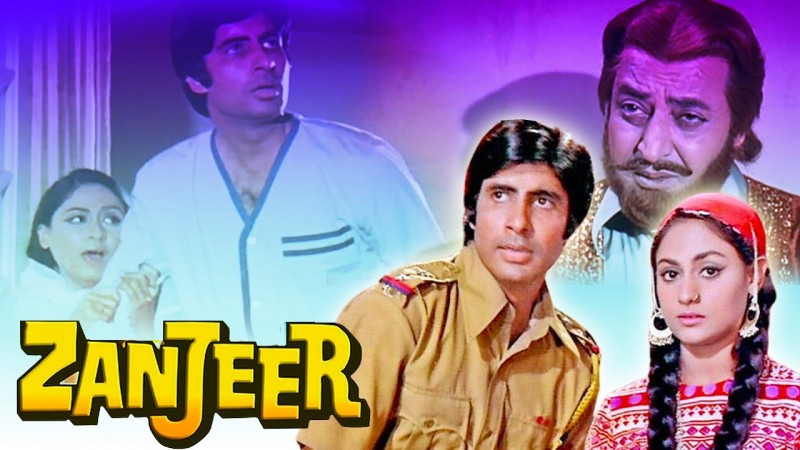
The rise of Amitabh Bachchan, the actor who would later become the "Shahenshah" of Bollywood, is one of the most well-known and influential tales in the history of Indian cinema. Numerous important films helped pave Amitabh Bachchan's path to fame, but none was quite as significant as the 1973 classic "Zanjeer." In addition to making Bachchan a star, this gritty and action-packed movie also saw the beginning of the "angry young man" persona that would come to characterise his illustrious career.
Understanding the historical backdrop of "Zanjeer" is crucial before discussing how the movie affected Amitabh Bachchan's career. In India, the early 1970s were a period of unrest characterised by social unrest, economic upheaval, and political unrest. Indian cinema, which was going through its own transformation, found reflection in this turbulent backdrop.
During this time, Bollywood's traditional formula of melodramatic romances and family dramas was starting to lose its appeal. Something unique that spoke to their frustrations and aspirations was what audiences were hankering for. This was the setting where "Zanjeer" came into being.
In the Prakash Mehra-directed film "Zanjeer," Vijay, a brooding and fearless police officer, is drawn into a convoluted web of corruption and crime. Vijay is a man of few words, but he is also filled with a burning rage and a desire for justice. His journey starts when he is a young child and witnesses his parents' murder, an experience that permanently scars him.
As he gets older, Teja, a notorious gangster who is portrayed by the incomparable Ajit Khan, is the subject of a case that Vijay is given when he joins the police. Teja's criminal empire is based on lies, killings, and manipulation. The plot of the movie develops as Vijay battles Teja and his gang of criminals, including the seductive Mona, who is portrayed by the talented Bindu, with his unyielding determination and righteous rage.
In Amitabh Bachchan's career, "Zanjeer" represented a turning point. Bachchan was having trouble establishing himself in the industry and had played a number of unmemorable roles prior to this movie. But everything was altered by "Zanjeer".
It's impossible to overstate how electrifying Bachchan's Vijay portrayal was. He captivated audiences with his commanding presence, rich baritone voice, and brooding persona. He was the poster child for the irascible young man, someone who was not afraid to challenge authority and take matters into his own hands. A generation of viewers were deeply moved by this stark departure from the typical Bollywood hero.
Bachchan's appeal was heightened by the legendary Salim-Javed writing team's iconic dialogue from the movie. The sayings "Yeh police station hai, tumhare baap ka ghar nahi" (This is a police station, not your father's house) and "Sher Khan, tumhe koi haq nahi banta ki tum itni haseen dikho" (Sher Khan, you have no right to look so beautiful) were made immortal in Indian cinema.
"Zanjeer" was not only a critical and financial success; it also became a phenomenon in society. Audiences all over the country were enthralled by the movie's realistic plot, thrilling action scenes, and enduring music. The songs, which were written by Kalyanji-Anandji and featured playback vocals from Lata Mangeshkar and Kishore Kumar, topped the charts.
Amitabh Bachchan and Jaya Bhaduri, who later changed her name to Jaya Bachchan, had a strong on-screen chemistry that gave the narrative depth and emotion. Bachchan and Prakash Mehra's productive on-screen partnership began with the movie, and they later worked together on several other blockbusters.
Amitabh Bachchan's life wasn't the only thing "Zanjeer" changed; Indian cinema as a whole was transformed. A new era of filmmaking marked by socially conscious themes, intricate characters, and a gritty, realistic aesthetic was ushered in by the movie's unprecedented success. Numerous Bollywood protagonists adopted the "angry young man" archetype as a model.
Filmmakers started exploring topics like social injustice, crime, and corruption once they realised how eager audiences were for stories that depicted the harsh realities of society. From earlier escapist cinema, this represented a significant shift.
The influence of "Zanjeer" goes well beyond the confines of its era. It still has an impact on Bollywood today and continues to motivate filmmakers. Amitabh Bachchan played the irascible young man Vijay, and his portrayal of the character has become one of the most recognisable and beloved in Indian cinema.
The movie also had a significant influence on Bachchan's professional development. He continued to appear in a number of films, such as "Deewar," "Sholay," "Don," and "Trishul," which cemented his reputation as a megastar. His portrayals of the irate young man in these films continued to capture the essence of the character, and his popularity reached new heights.
"Zanjeer" was more than just a movie; it had a profound impact on Indian culture and cinema. Amitabh Bachchan's rise from struggling performer to superstar was nothing short of amazing, and "Zanjeer" was the film that propelled him to these heights. The gritty storyline, memorable dialogue, and Bachchan's electrifying performance as the irate young man left a lasting impression on the industry and helped usher in a new period of filmmaking.
As we reflect on "Zanjeer's" legacy, we are in awe of both its enduring influence and its contribution to the development of Indian cinema. It continues to serve as a testament to the power of narrative and the capacity of film to capture and reflect the shifting attitudes and aspirations of a people.
Koffee With Karan Season 8 Returns with Hilarious Self-Trolling by Karan Johar
Koffee With Karan Season 8 Returns with Hilarious Self-Trolling by Karan Johar
Tiger 3 Trailer Unveiling Date Confirmed: Salman Khan and Katrina Kaif Return in Spy Thriller